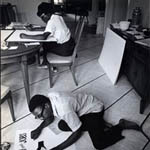By Beryl Hunter, Graduate Student Intern, Amistad Research Center
 “Working for Freedom: Documenting Civil Rights Organizations” is a collaborative project between Emory University’s Manuscript, Archives and Rare Book Library, The Auburn Avenue Research Library on African American Culture and History, The Amistad Research Center at Tulane University, and The Robert W. Woodruff Library of Atlanta University Center to uncover and make available previously hidden collections documenting the Civil Rights Movement in Atlanta and New Orleans. The project is administered by the Council on Library and Information Resources with funds from the Andrew W. Mellon Foundation. Each organization regularly contributes blog posts about their progress.
“Working for Freedom: Documenting Civil Rights Organizations” is a collaborative project between Emory University’s Manuscript, Archives and Rare Book Library, The Auburn Avenue Research Library on African American Culture and History, The Amistad Research Center at Tulane University, and The Robert W. Woodruff Library of Atlanta University Center to uncover and make available previously hidden collections documenting the Civil Rights Movement in Atlanta and New Orleans. The project is administered by the Council on Library and Information Resources with funds from the Andrew W. Mellon Foundation. Each organization regularly contributes blog posts about their progress.
For more information about the collection described in this post, please contact the Amistad Research Center, reference [at] amistadresearchcenter [dot] org
My name is Beryl and I’m a graduate student in Museum Studies at Southern University at New Orleans. For the past few months, I have been interning in the processing department at the Amistad Research Center. The initial reaction when entering the reading room is one of respect as historical facts surround you. Every person in the Center from the director to the permanent employees, interns and volunteers, plays a vital part in the Center. I have found working in an environment focused on cultural preservation and learning the archival method to be of value. I am currently processing the Jason Berry papers (1966-1987), which are an important contribution to researchers of the civil rights movement. The Berry papers document the development of a writing career during a period when the landscape of American society was rapidly changing.
Berry, a New Orleans native, is an acclaimed author, prolific journalist, and film director who has written extensively on Southern politics, culture and religion. The documentation of Berry’s involvement in the Civil Rights Movement provides interesting insight from the perspective of a young career-minded college graduate who landed a job as press secretary for Charles Evers during his bid for governor of Mississippi in 1971. Charles Evers, mayor of Fayette, Mississippi, was the brother of slain civil rights leader, Medgar Evers. Berry published his first book, Amazing Grace: With Charles Evers in Mississippi (1973), which provided insight into Southern election practices, voter fraud, and violence at the polls.
The Berry papers focus primarily on race relations, politics, and voting practices in Mississippi during the 1970s. Articles, audio-taped speeches, correspondence, and video productions related to Evers’ gubernatorial campaign make up the bulk of this collection. Also included is correspondence from Berry’s mentors: David Chandler, of Life Magazine; Hodding Carter III, of the Delta Democratic Times; and Berry Morgan and Walker Percy, both southern writers who Berry consulted for advice.
I believe that Berry’s perseverance is impressive and inspiring. He never gave up his love for investigative reporting despite whether the subject matter was controversial or un-popular. Processing the Jason Berry papers has been a very rewarding experience for me.
